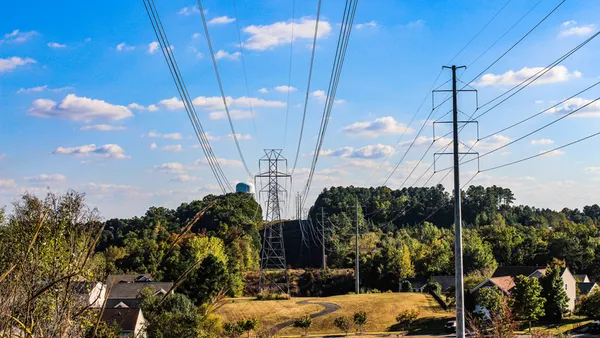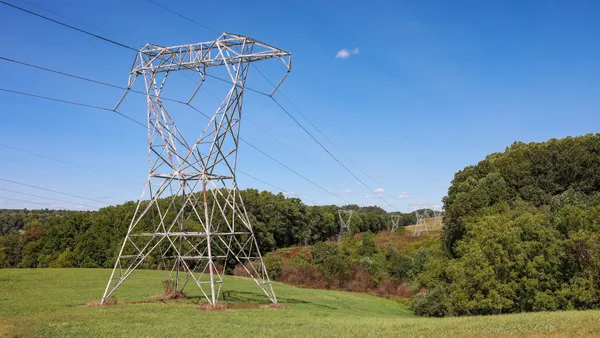Dive Brief:
- Some 154 companies spanning multiple industries have signed President Obama's American Business Act on Climate Pledge, but so far the list includes only one of the 20 largest U.S. electric utilities based on market value: Pacific Gas & Electric Co (PG&E).
- In October, the utility pledged to to reduce greenhouse gases and address the impacts of global warming, promising to Invest approximately $3 billion a year through 2020 to modernize the electric grid.
- McClatchy DC reports the rest of the 20 largest utilities in the U.S., despite not signing on to the pledge, are currently working on plans to meet goals set by the Clean Power Plan, which targets a 32% reduction in greenhouse gas emissions.
Dive Insight:
States and utilities across the United States have begun working on compliance plans to meet the Clean Power Plan, but despite similar goals, McClatchy DC reports that 19 out of the country's largest 20 electric utilities have not signed on to the President's climate pledge for businesses.
The initial list of companies, pledging to invest more resources in combating the "global challenge," included: Google, Coca-Cola and Bank of America. Berkshire Hathaway Energy (owner of Pacificorp and Rocky Mountain Power), National Grid and Portland General Electric were some of the other major U.S. utilities to sign onto the accord, although none are listed as one of the 20 largest utilities in the U.S.
“Despite the fact that they’re not signing on to the president’s pledge, I’ve seen from reports that most are active at the state level developing the state implementation plans that are called for under the EPA rules,” Bryan McGannon, policy director at the American Sustainable Business Council, told McClatchy.
Three major utilities that didn't sign the pledge pointed to moves aimed at reducing greenhouse gas emissions made by their respective companies.
Duke Energy, one of the largest electric utilities in the U.S., highlighted its move to set voluntary carbon reduction goals, claiming that it has cut down carbon emissions by 22% since 2005, company spokesman Sean Patrick Walsh wrote McClatchy DC in an email.
A Southern Company spokeswomen said the utility is focused on "developing real energy solutions for a carbon-constrained future," but the focus "must be on developing and deploying technologies that reduce greenhouse gases while making sure that electricity remains reliable and affordable."
And Dominion Resources said it has cut carbon emissions by 28% since 2008, and that they expect further reductions by developing natural gas-fired plants and incorporating more solar energy, according to a company spokesman.
For its part, Berkshire Hathaway Energy committed to build additional 552 MW of new wind generation in Iowa, increasing MidAmerican Energy Co.'s generating portfolio to more than 4,000 megawatts of wind, and to retire more than 75% of the company's coal-fueled generating plants.
PG&E, when it signed onto the pledge in October, said it would invest approximately $3 billion a year through 2020 to both modernize the grid to make it more resilient.
"A modern grid is absolutely essential to integrating and optimizing all of the new clean energy technologies we’re seeing today and to our success in achieving our shared goals for reducing greenhouse gases,” PG&E CEO and President Tony Early said in a statement.
PG&E also said it would expand the system-wide deployment of a mobile gas leak detection system that can find more natural gas leaks faster, and will weatherize a half million homes to assist low-income customers.
Clarification: An earlier version of this article stated in the headline and first bullet that PG&E is the "only large electric utility" that signed on to President Obama's American Business Act on Climate Pledge. The article went on to elaborate that PG&E is the only one of the 20 largest U.S. electric utilities based on market value to sign the corporate climate pledge. Other U.S. electric utility companies signed the pledge, including National Grid, Berkshire Hathaway Energy (which owns PacifiCorp and Rocky Mountain Power) and Portland General Electric. However, none of those companies are among the 20 largest electric utilities in the U.S. based on market value. We have since amended the article to make this more clear.














